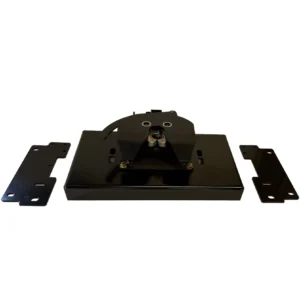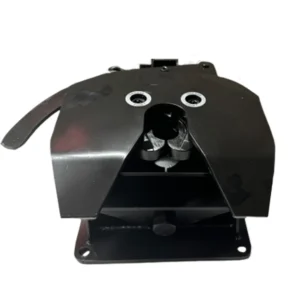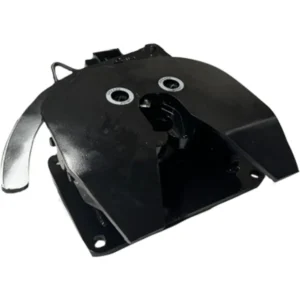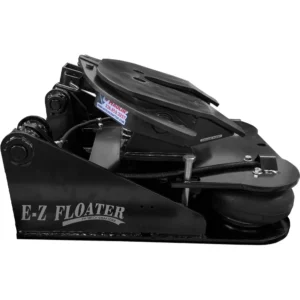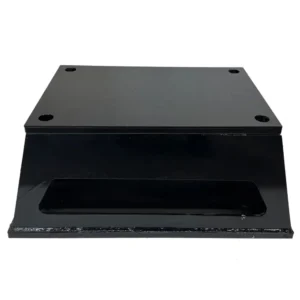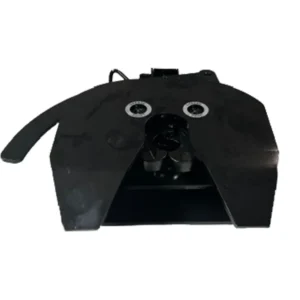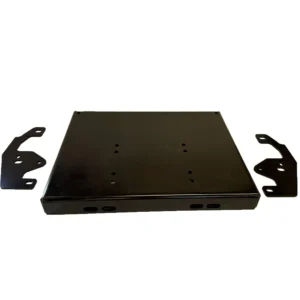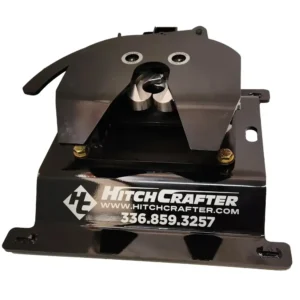We get this question a lot at HitchCrafter. First, you need to know the towing capacity for your truck, the legal limit for your license, as well as the age of the truck, and other factors. The strength of the internal components, such as the locking jaw, often determines the towing capacity; however, higher-quality components can increase the towing capacity of the equipment.
At Hitch Crafter, we know 5th-wheel hitches up and down and all around. In this article, we discuss the factors that come into play when understanding how much you can haul with a 34k 5th-wheel hitch.
Hauling with a 34K 5th-Wheel Hitch
Two numbers–towing capacity and cargo capacity–are both integral when understanding how much you can haul with a 34k 5th-wheel hitch. But, you also need to know the weight of the payload capacity for the vehicle as well as other factors that can impact the hauling capacity.
34K 5th-Wheel Hitches Built for Heavy Hauling
-
34K Single Pivot Bolt on Kit
$1,450.00 -
34K Double Pivot Bolt on 5th Wheel Kit
$1,650.00 -
34K Haulin’ Head Unit With Bolt On Plate
$995.00
Truck’s Towing Capacity
The towing capacity number is based on the engine and transmission. It is how much your truck can pull (and stop) safely. You can find this number by searching for towing charts for the year and model of your vehicle. These charts are available online however, you can calculate this number. Online you can find the towing capacity for the truck style, engine, and axle ratio. There are separate charts for a 5th-wheel and a conventional bumper pull, so be sure to use the correct chart.
Cargo Capacity
A truck’s cargo capacity is how much weight it can hold in (or on) the truck itself. You calculate this number by using the truck’s Gross Vehicle Weight Rating (GVWR) and subtracting the truck’s curb weight when it leaves the factory before any fluids are added. The cargo capacity is specific to each truck and can be found on a yellow “Tire and Loading Information” sticker inside the driver’s side door jamb.
The number on the sticker will be the combined weight of occupants and cargo. So, you must take into consideration the weight of you, your passengers, pets, tools, and even the 5th wheel itself. It is more than likely that these items account for a few hundred pounds (just the hitch may weigh 100 pounds or more).
A 5th wheel will have between 20% and 25% of its total weight on the pin. The percentage will vary depending on how things are loaded (if there is a generator in the front bay, and so forth). When you have a range to work with, it is simple math to calculate a general range of the 5th wheel by multiplying your true cargo capacity by 4 for the low end (25% on the pin) and 5 for the high end (20% on the pin).
Payload Capacity
The payload capacity is the maximum weight it can safely carry in the cargo area in addition to its empty weight, or curb weight. Payload capacity is different from towing capacity. To find the payload capacity number, you can:
- Find the curb weight and GVWR - This information is usually in the owner’s manual or on a sticker inside the driver’s side door. The curb weight is the weight of the truck without passengers or anything inside, including fluids. Basically, the curb weight is the weight of the truck when it leaves the factory.
- Subtract the curb weight from the GVWR - The difference is the payload capacity.
Gross Combined Weight Rating
If you are under your tow rating and your cargo capacity, you generally don’t need to be concerned too much with GCWR. You should still know what it is. GCWR is the maximum combined weight of the truck and everything that is connected to it or in it. The GCWR is in the owner’s manual for your vehicle. This represents the maximum allowable weight of your vehicle and trailer combined, including cargo and passengers.
Suspension & Pivot Options That Support Maximum Capacity
-
34K Single Pivot Air 2 Bag Suspension Hitch
$2,695.00 -
34K Double Pivot 2 Bag Air Suspension Hitch
$2,895.00 -
5th Wheel Riser Bases
Price range: $250.00 through $300.00
Age of the Truck
The age of your truck significantly affects its towing capacity because older trucks tend to have weaker engines, worn-out suspension components, and outdated technology. These factors can contribute to a reduced ability to safely tow heavy loads compared to newer models with improved engineering and design. Always consult the owner’s manual for your vehicle to get the most accurate towing capacity information based on your specific truck’s age and condition.
Condition of the Engine
The condition of the engine and tires are important factors in the towing capacity of your vehicle. Older engines may have less horsepower and torque which makes it more difficult to accelerate and maintain speed while towing heavy trailers.
- The wear on the transmission components in older trucks can lead to decreased towing capacity and potential transmission damage when pulling heavy loads.
- Older suspension systems could be less robust, leading to instability and reduced towing capacity when towing heavy trailers.
- Older trucks may have less efficient braking systems, which make it difficult to safely slow down and stop when towing a heavy load.
- Newer trucks have technology advancements that incorporate advanced features like electronic stability control and trailer sway control, enhancing towing safety and stability.
Heavy-Duty Hitch Components for Older or High-Mileage Trucks
-
34K Haulin’ Head Unit
$895.00 -
Mounting Plate for Cab and Chassis Trucks
$515.00 -
ISR Rail Adapters
$1,245.00
Condition of the Tires
If your truck has worn or improperly rated tires, the towing capacity will be impacted significantly. Worn tires can reduce traction, handling, and stability when towing a trailer. This will compromise the truck’s ability to safely pull the intended weight. In other words, poor tire condition can lower your effective towing capacity even if your truck is technically capable of towing a heavier load.
Here are some key points about tire condition and towing capacity:
- Tread depth - Worn tires with low tread depth provide less grip on the road. This leads to decreased traction and control when towing, especially in challenging conditions like wet or slippery surfaces.
- Tire type - Using tires that are not designed for towing, such as standard passenger car tires, can be inadequate for the added weight and stress of pulling a trailer because they may not have the necessary load capacity or construction to handle the load.
- Inflation press - Improper tire inflation, either too low or too high, can affect handling, stability, and tire wear, all of which impact towing performance.
- Tire load rating - Look for tires with a load rating appropriate for your truck’s towing needs, typically indicated by a higher ply rating (like E or higher).
Driving Conditions
Driving conditions significantly impact the amount you can haul with a 34k 5th-wheel trailer. Factors like steep inclines, high winds, and poor road surfaces can drastically reduce a truck’s towing capacity, making it unsafe to haul the full weight of the trailer in such situations.
- Grade - Steep inclines require more power from your engine to maintain speed, effectively reducing the amount of weight you can safely tow.
- Wind - Strong crosswinds can put stress on the trailer, making it harder to control and potentially exceeding your truck’s towing capacity.
- Road surface - Poor road conditions like uneven pavement or loose gravel can affect stability and handling, causing issues with towing a heavy load.
- Weather - Snow, ice, or heavy rain can reduce traction and visibility, impacting your ability to safely tow a large trailer.
Adjust your load based on driving conditions by:
- Reducing weight when necessary
- Monitoring your truck’s performance
- Planning your route carefully
- Consulting your truck’s towing specifications
Legal Limit on Dimensions of Trailers and for Your License
North Carolina has restrictions on the dimensions of trailers, including:
- The total length of the combination of vehicles (towing vehicle and trailer) cannot exceed 60 feet.
- The maximum allowable width for trailers is 102 inches, including the load.
You don’t need a CDL in North Carolina unless you are using the vehicle for commerce. In North Carolina, the type of driver’s license you need for towing depends on the Gross Vehicle Weight Rating (GVWR) of the vehicle and trailer.
Class B CDL - This is required if the vehicle’s GVWR is greater than 26,000 pounds, even if the trailer’s GVWR is less than 10,000 pounds.
Class A CDL - This is required if the tow truck’s GCWR is 26,001 pounds or more and the towed vehicle’s GVWR is greater than 10,000 pounds.
Class C CDL - This is required if the tow truck and towing configuration don’t fit the above descriptions, but the vehicle being towed requires a placard for hazardous materials.
Where Can I Buy a 34k 5th Wheel Hitch?
You're in luck! HitchCrafter manufactures and sells some of the best 5th wheel trailer hitches and hot shot bodies you will find anywhere. You can shop our options with our online hitch finder, or browse our 5th wheel hitches in our online store. If you have any questions about the equipment you need, you can contact us today by filling out the form below. Get started on your towing adventure today!
Contact Us
Let's make something special! Provide us with the vehicle information and a short description for what you're looking for. We'll contact you with some ideas to get started.
"*" indicates required fields


